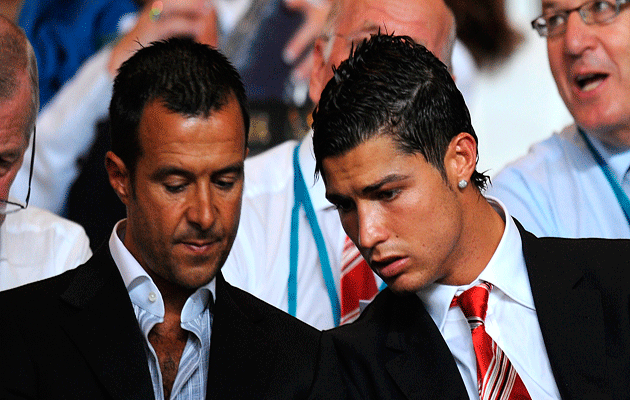Jorge Mendes’ rise from small-time Porto entrepreneur to star maker in football’s multi-millionaire transfer market reflects the game’s 20-year moneyed transformation. And in 2014 his work reached a new zenith.
For years Mendes was unassailably dominant in Portugal as an exporter of footballers, and the agent to Jose Mourinho – who has signed Mendes’ players at all his clubs. For the past 12 months the “super agent” seemed almost to be orchestrating the line-ups of Europe’s top teams.
Last summer’s biggest deals were all Mendes brokered, such is his influence. Two of the players in headline moves had been bought by Monaco for massive fees – also negotiated by Mendes – just a year earlier. James Rodriguez had gone from Porto to the club in the tax haven on the Cote d’Azur, where Russian billionaire Dmitri Rybolovlev briefly seemed to fancy doing a Roman Abramovich, for £36million. Radamel Falcao was signed by Monaco
for £52m, two years after his £32m move to Atletico Madrid from Porto – which Mendes also brokered.
Porto publicly declares the fees it pays to agents in “intermediation service costs”, and stated in its annual report that it paid Mendes’ company, Gestifute, £3.6m when Rodriguez left, and split £3m with another agency, Orel, on the Falcao sale.
A year on, the continental plates had shifted. Rybolovlev was realising just how much a galactico policy could cost him, together with the new financial fairplay limitations, and the Glazers’ Manchester United had been startled by the David Moyes slump into realising they had to make some A-list signings. Rodriguez excelled at the World Cup, volleying himself onto Real Madrid’s shopping list, and went to the Bernabeu for a staggering £71m. Falcao subsequently joined the new roster at Old Trafford on a highly expensive loan.
Angel Di Maria really signalled the end of the Glazers’ thrift policy, which Alex Ferguson had spun miraculously into silverware, United blitzing their previous transfer limit with a fee of almost £60mfor a genuine international star allowed to leave Real Madrid.
Photographers loitering outside United’s Carrington training ground down that long Cheshire farm track snapped Mendes, grinning, making people happy – the clubs, the player and the new manager Louis Van Gaal – in the back of a car taking Di Maria to his new employer.
The other biggest Premier League deals were also sealed by Mendes: Eliaquim Mangala, the strong centre-half signedby Sheikh Mansour’s Manchester City for £32m – from Porto again – and Diego Costa, Atletico Madrid’s coveted goalscorer, brought by Abramovich to Chelsea for the same figure.
The fees Mendes earned on these deals are not known and will not be declared by anyone except Porto, nor will the work for which he earned them be explained. Was he acting for the players, negotiating their stratospheric earnings, or for the clubs, to seal the deal? And is there really any difference between those roles any more? The Porto classification of his services, “intermediation,” seems to communicate clearly the modern reality of agents.
Mendes has also been deeply involved with third-party ownership of players’ actual economic rights, acting as advisor with former Chelsea chief executive, Peter Kenyon, to funds in the Quality Sports group, which buys stakes for investors promised a 32 per cent annual profit.
A prospectus seeking to raise cash in Gibraltar, a tax haven, for one of the funds, Quality Sports V Investments LP, registered in Jersey – another tax haven – boasted to potential investors of Mendes’ unrivalled influence, particularly in Portugal. It stated that in the decade to 2010 he conducted transfers worth 78 per cent of Sporting Lisbon’s total earnings of £70m, 51 per cent of Benfica’s £85m deals, and 70 per cent of the £189m transfers at the much more productive Porto. Altogether, the document said, Mendes had been involved in 68 per cent of the transfer business done by Portugal’s three big clubs during those years of the country’s players leaving to populate teams across Europe.
That dominance endures, but having first taken Cristiano Ronaldo to Manchester United in 2003, then to Real Madrid for £80m six years later, Mendes’ deal-making has extended beyond his home base. This year he bestrode the heights, making untold fortunes.
There is no sign his influence is waning – in fact, quite the opposite.
By David Conn







